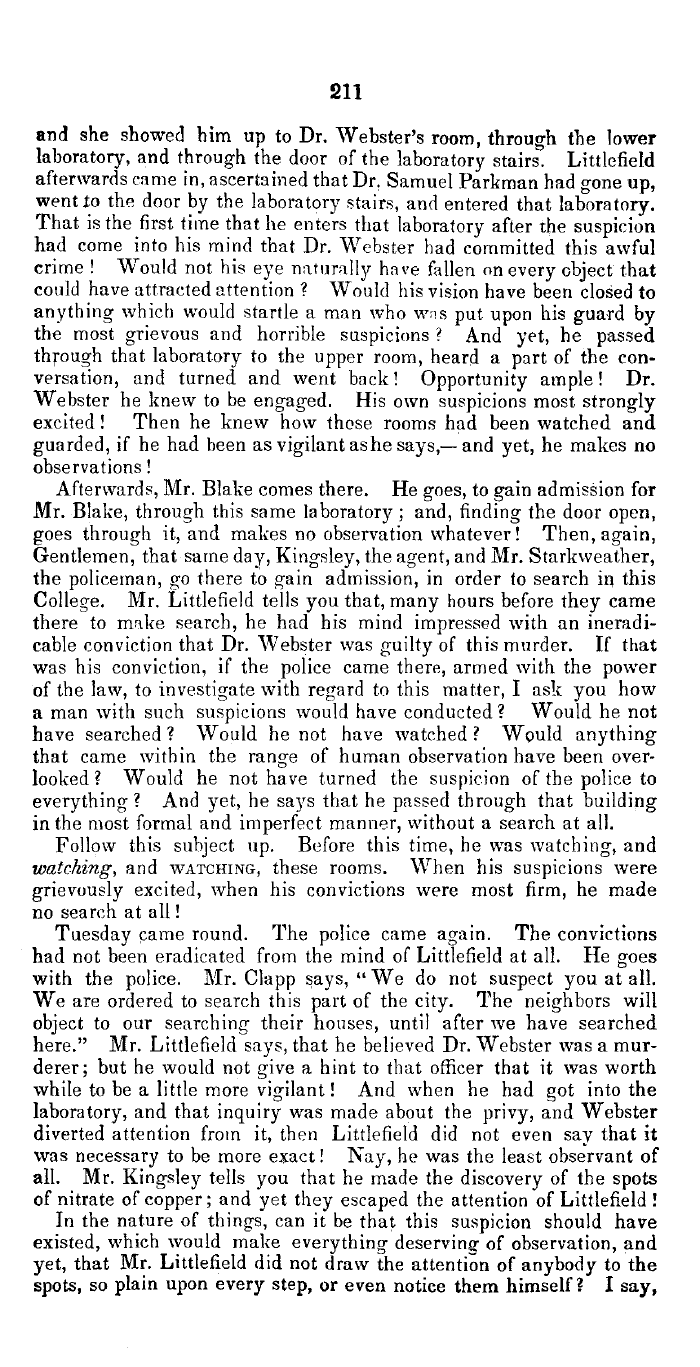|
211
and she showed him up to Dr. Webster's room, through the lower
laboratory, and through the door of the laboratory stairs. Littlefield
afterwards came in, ascertained that Dr. Samuel Parkman had gone up,
went lo the door by the laboratory stairs, and entered that laboratory.
That is the first time that he enters that laboratory after the suspicion
had come into his mind that Dr. Webster had committed this awful
crime ! Would not his eye naturally have fallen on every object that
could have attracted attention ? Would his vision have been closed to
anything which would startle a man who w;is put upon his guard by
the most grievous and horrible suspicions ? And yet, he passed
through that laboratory to the upper room, heard a part of the con-
versation, and turned and went back! Opportunity ample! Dr.
Webster be knew to be engaged. His own suspicions most strongly
excited ! Then he knew how those rooms had been watched and
guarded, if be had been as vigilant ashe says,- and yet, he makes no
observations!
Afterwards, Mr. Blake comes there. He goes, to gain admission for
Mr. Blake, through this same laboratory ; and, finding the door open,
goes through it, and makes no observation whatever! Then, again,
Gentlemen, that same day, Kingsley, the agent, and Mr. Starkweather,
the policeman, go there to gain admission, in order to search in this
College. Mr. Littlefield tells you that, many hours before they came
thereto make search, he had his mind impressed with an ineradi-
cable conviction that Dr. Webster was guilty of this murder. If that
was his conviction, if the police came there, armed with the power
of the law, to investigate with regard to this matter, I ask you how
a man with such suspicions would have conducted? Would he not
have searched ? Would he not have watched ? Would anything
that carne within the range of human observation have been over-
looked? Would he not have turned the suspicion of the police to
everything ? And yet, he says that he passed tbrough that building
in the most formal and imperfect manner, without a search at all.
Follow this subject up. Before this time, he was watching, and
watching, and WATCHING, these rooms. `'Then his suspicions were
grievously excited, when his convictions were most firm, he made
no search at all !
Tuesday came round. The police came again. The convictions
had not been eradicated from the mind of Littlefield at all. He goes
with the police. Mr. Clapp says, " We do not suspect you at all.
We are ordered to search this part of the city. The neighbors will
object to our searching their houses, until after we have searched
here." Mr. Littlefield says, that he believed Dr. Webster was a mur-
derer; but he would not give a hint to that officer that it was worth
while to be a little more vigilant ! And when he had got into the
laboratory, and that inquiry was made about the privy, and Webster
diverted attention from it, then Littlefield did not even sav that it
was necessary to be more exact! Nay, he was the least observant of
all. Mr. Kingsley tells you that he made the discovery of the spots
of nitrate of copper; and yet they escaped the attention of Littlefield !
In the nature of things, can it be that this suspicion should have
existed, which would make everything deserving of observation, and
yet, that Mr. Littlefield did not draw the attention of anybody to the
spots, so plain upon every step, or even notice them himself ? I say,
|

